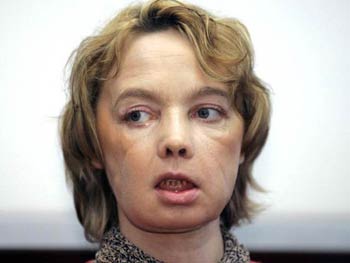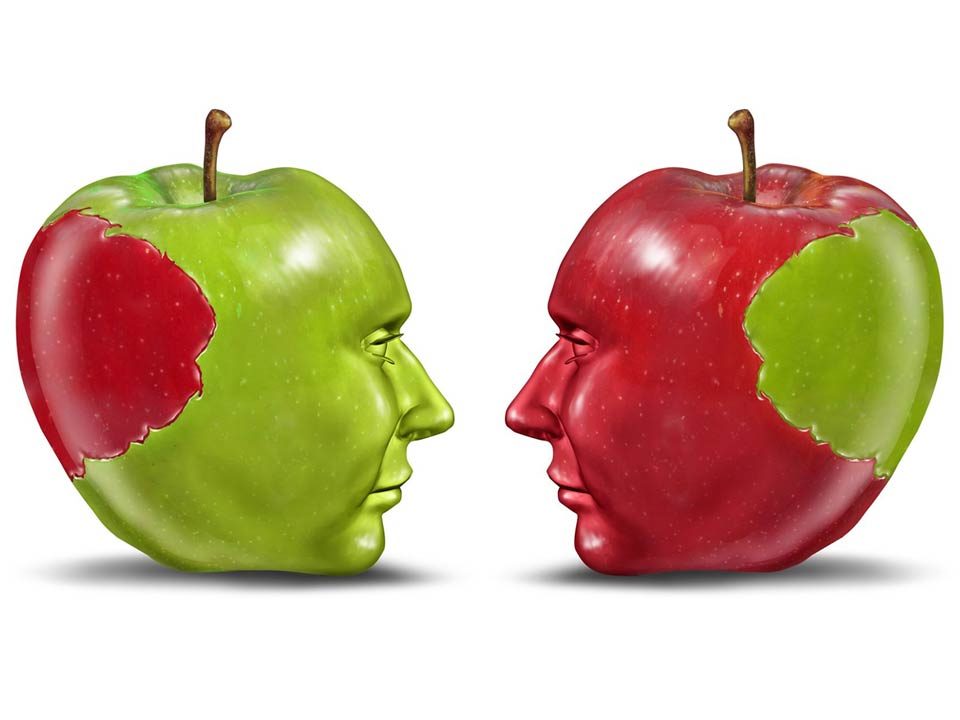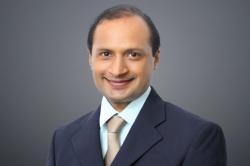We hear from the media about the recent sad death of Isabelle Denoire, who was the first person to undergo a partial face transplant in France in 2005. Her lips and most of her lower face had been ripped off by a dog. She was desperate for a semblance of a normal countenance, and agreed for the face transplant. The transplant was successful.

Face Transplant Recipient Isabelle Dinoire
What did her in was reportedly, cancer. Cancer is a known complication of immune suppression by medicines that are a must after any transplant. She was 49 years old and had her surgery done at 38. Her death is a reminder that the field of transplantation is still evolving. We need to progress further, for it to be offered indiscriminately. Even then, the risks may not go off completely.
Transplantation of kidneys, liver, heart, lungs, pancreas, intestine etc. is now reasonably well established. These are organs. Tissues like cornea, skin and bone can also be transplanted. The decision of the near ones to donate these from their dear one who has just died is one of the noblest gestures of them all. Some organs like kidney and part of liver can be donated by a living person.
The New Age
There are some newer developments. Face and Hand Transplants belong to that category. Composite tissue transplants sometimes called reconstructive transplants are relatively new. They are parts of the body that contain multiple tissues like skin, bone, muscle, nerve and more.
Hand Transplants
Till now, more than hundred hands have been transplanted across the world. Most have been done on patients who have lost their hand or hands to trauma. A hand transplant was done in Equador in 1964 and was rejected by the patient’s body. This was probably due to the poorly developed immune suppression at the time. The next one was performed in Lyon, France, in 1998. This operation was only a short term success. The patient, Clint Hallam, could not adjust to the new hand and he hated the idea of life-long medicines for immune suppression. He did not take the medicines properly and the hand had to be taken out.
The first hand transplant to achieve prolonged success was directed by a team of surgeons including Warren Breidenbach, Tsu-Min Tsai, Luis Scheker, Steven McCabe, Amitava Gupta, Russell Shatford, William O’Neill, Martin Favetto and Michael Moskal in cooperation with the Christine M. Kleinert Institute, at the University at Louisville , USA. The first few successful hand transplants were done by them.
The first double hands transplant was first done in Austria in 2000.
The first double hands transplant in South Asia was done at Amrita Institute of Medical Sciences at Kochi on 2015, January. Two more double hands transplants were done after that, at the same centre.
Face Transplants
Faces have been transplanted, over thirty in number. These have been done on patients so disfigured that many cannot eat and some have to breathe through a tracheostomy. The world’s first partial face transplant on a living human was carried out on 27 November 2005 in Amiens, France on Isabelle who underwent the surgery to replace her original face, which had been mauled by her dog. A triangle of face tissue from a brain-dead woman’s nose and mouth was grafted onto the patient.
In December 2008, a team at the Cleveland Clinic, led by Prof. Maria Seimionov and team did a full face transplant. Her team was the one that developed and standardize the surgery properly.
Ethics of Hands & Face Transplantation
The ethics of transplantation has been extensively discussed. It is clear that Life-saving transplants are ok. Liver, heart and sometimes others come in this category. Kidneys also can be tentatively included. Dialysis can replace kidney function, though it is now accepted to be inferior to a transplant.
Hands and face are different. They are not life-saving transplants. They are highly visible parts of the body, and closely related to the identity of the individual. They are technically difficult.
There is consensus that transplants should be done only for treatment. It should not be done for reasons of vanity or for marginal benefit. Hands can be done from only brain-dead persons. No hand can be taken from a living person, even with consent.
What is the state of hands and face transplants?
Our experience is not complete. The oldest surviving hand is only seventeen years old. Only posterity can judge us. There is no doubt that some of these transplants are, essential.
The fact that adequate preparation and a full, sustained team work are essential is clear if you look at the history of these transplants. The hand transplant at Equador was a disaster, because even the immunity suppressing medicines were not standardised at the time. The next one at France failed, though not immediately, probably due to poor patient selection.
But the fact remains that we are replacing a disability with a disease. And that is the disease of immune suppression. It cannot be taken lightly.
Prolonged suppression of the immune system of the body is needed for any transplant of an organ as it reduces the capacity of the body to reject the organ. But this can lead to complications. Chronic diseases like hypertension, diabetes and thinning of bones can occur. Sudden infection may overwhelm the body and can lead to death in rare instances. Patients on immune suppression can develop certain cancers like lymphomas. That is why for the present, some say that one should do double hands only for patients who have lost both their hands. But most hand transplants that have been done till now were single ones. We have tentatively decided to keep them like that for the time being.
In addition to hands and face – larynx, knee, uterus, and even a penis has been transplanted. The benefits have not been widely accepted and the debates are on. We need more debate, studies and discussions. These are an essential part of progress.
The tragedy is that all these cadaver transplants are dependent on another tragedy – a valuable person becoming brain dead. And immune suppression is a major impediment. We can only for the day when organs – and parts of bodies – can be grown in the lab from one’s stem cells.
Then we won’t need immune suppression. We can then move from repairing-medicine to replacement-medicine. We are some way off from that, but hopefully, we will reach it.



Please send me all information on Liver transplant. Suitable candidate/who can accept, who can give. Information on Living donor.
Hi Amit,
Please do call us at 01141838382 for information.
Regards
ORGAN India Team
Very nice article. Honest expressions.
It is good but how can we know that any one will donate his/her organ.is there any proof or donor card for donor.plz let me know the details about it.
Regards
Sampad biswal
Hi Sampad,
You can pledge to donate your organs after your death. You can sign up for a donor card at our website http://www.organindia.org. Please fill in the form under Claim Your Donor Card and we will send you the donor card. However it’s most important that you tell your family about your decisions, as they will ultimately decide to donate your organs.
Regards
I Have already donate my every thing to Govt. of India NOTTO scheme. I am realy thankful to Govt.of india that they accept my proposal & accept my donor proposal….
Thank You.
Sir my brother had met an accident last month,unfortunately he lost his right hand…is there any remedies,please help me know
Stunning story there. What occurred after? Good luck!